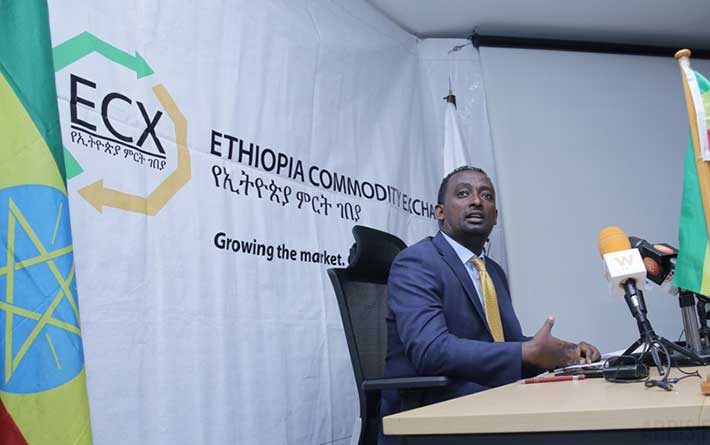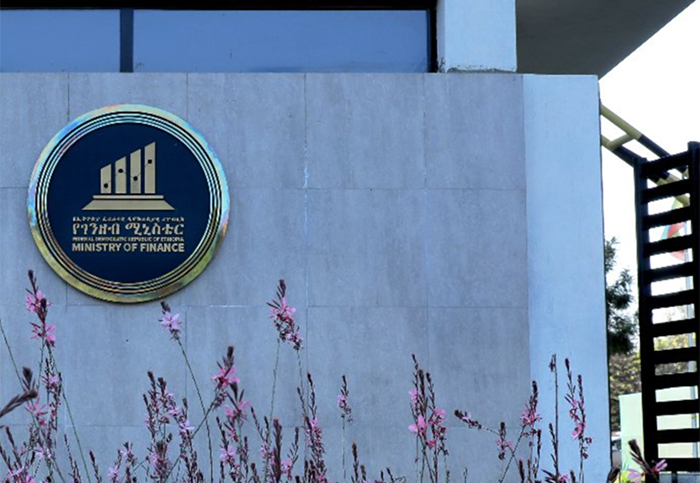
Radar | Apr 30,2022
Aug 3 , 2019
By BERHANE HAILEMARIAM ( FORTUNE STAFF WRITER )
 It also provides a solution to seasonal market fluctuations exhibited during a post-harvesting time where there is high supply and lower prices of the products, according to Wondimagegnehu Negera, CEO of ECX.
It also provides a solution to seasonal market fluctuations exhibited during a post-harvesting time where there is high supply and lower prices of the products, according to Wondimagegnehu Negera, CEO of ECX. The Ethiopian Commodity Exchange (ECX) started a new system that enables farmers to deposit their commodities in a warehouse as collateral to obtain loans. The farmers can store their commodities until the demand and the price of the commodity increases.
To be piloted in the coming post-harvest season, Warehouse Receipt Financing will be tested on selected products and cooperatives. The service will be started with cooperatives at places where maize is produced abundantly, such as Bure at Gojam, Amhara Regional State and Baku at Nekemt, Oromia Regional State, which were identified for the pilot test during the feasibility study.
The financing is a short-term loan, which lasts for not more than a year and enables the producers to achieve a higher sales value by storing the products for a certain period of time.
It also provides a solution to seasonal market fluctuations exhibited during a post-harvesting time where there is high supply and lower prices of the products, according to Wondimagegnehu Negera, CEO of ECX.
“The farmers could get a loan up to 70pc of the value of the commodity they stored,” he said. “Some banks have shown a positive inclination toward providing the service.”
ECX's move arrived on the scene months after the National Bank of Ethiopia drafted a new proclamation that will enable banks to take movable assets of companies or individuals as collateral for loans and advances. The proclamation for movable assets, which will allow low-income populations such as smallholder farmers and lower-scale entrepreneurs to secure loans for investment and job creation purposes, was legislated in June 2019.
ECX executed a year-long study on the demand of the cooperatives and the kind of products that are excessively produced, as well as select production places that have to get priority, according to Wondimagegnehu.
“The measure taken by ECX is very useful even though it is late,” said Mohammed Aman, assistant professor at the School of Agricultural Economy & Agribusiness at Haramaya University for more than a decade. “It reduces post-harvest waste and increases financial inclusiveness for the farmers.”
However, for better administration of the system, Mohammed recommends the trio - ECX, banks and cooperatives - sign a well-defined legal agreement.
"An agreement should be linked and transparent to each party, as the farmers should not lose their benefit," Mohammed said.
Established in 2008, ECX opened its 23rd transaction branch at Eli Ababora Zone Metu town last year. The Exchange transacted 5.7 million tonnes of various products with a value of 237 billion Br in the past eleven years of its existence.
It is also expanding warehouse facilities in Metu, Bule Hora and Tepi in Oromia and Southern regional states to push the capacity of the warehouses up by 152,000ql.
In the recently ended fiscal year, ECX has planned to receive 763,151tn of products and succeeded in fulfilling 93pc of the plan. It also planned to transact 673,057tn in the same fiscal period but outperformed the plan by one percent with 681,845tn. Coffee comprised 45pc of the transactions and sesame fulfilled 34pc.
Warehouse shortages, the decline of the value of coffee in the international market, less production due to environmental and climate change and the contraband trade of cereal products were the major challenges mentioned by the CEO.
PUBLISHED ON
Aug 03,2019 [ VOL
20 , NO
1005]

Fortune News | Aug 14,2021

My Opinion | Nov 04,2023

Fortune News | Jan 01,2022

Fortune News | Jul 06,2025

Fortune News | May 13,2023

Dec 22 , 2024 . By TIZITA SHEWAFERAW
Charged with transforming colossal state-owned enterprises into modern and competitiv...

Aug 18 , 2024 . By AKSAH ITALO
Although predictable Yonas Zerihun's job in the ride-hailing service is not immune to...

Jul 28 , 2024 . By TIZITA SHEWAFERAW
Unhabitual, perhaps too many, Samuel Gebreyohannes, 38, used to occasionally enjoy a couple of beers at breakfast. However, he recently swit...

Jul 13 , 2024 . By AKSAH ITALO
Investors who rely on tractors, trucks, and field vehicles for commuting, transporting commodities, and f...

Oct 18 , 2025
The political establishment, notably the ruling party and its top brass, has become p...

Oct 11 , 2025
Ladislas Farago, a roving Associated Press (AP) correspondent, arrived in Ethiopia in...

Oct 4 , 2025
Eyob Tekalegn (PhD) had been in the Governor's chair for only weeks when, on Septembe...

Sep 27 , 2025
Four years into an experiment with “shock therapy” in education, the national moo...